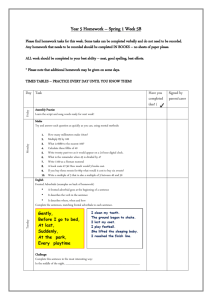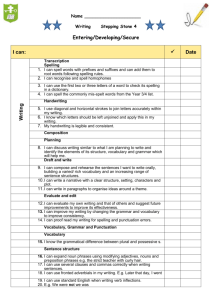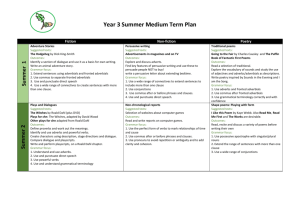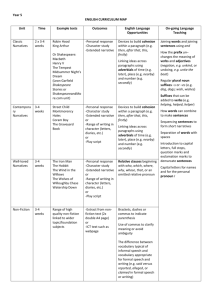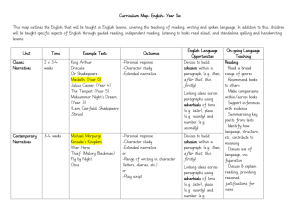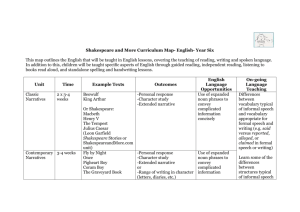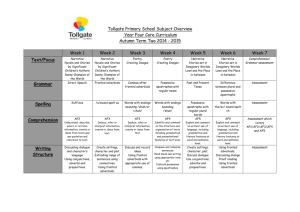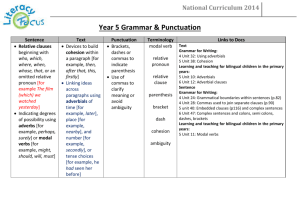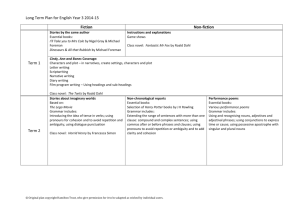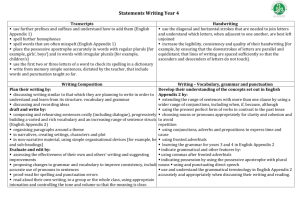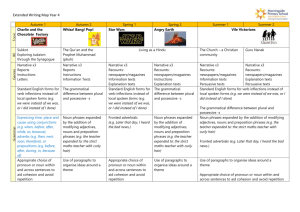Shakespeare and More Curriculum Map- English
advertisement
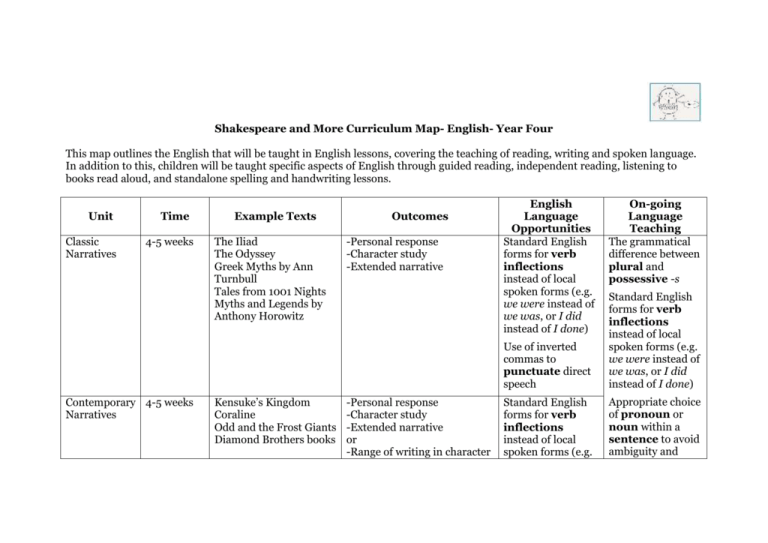
Shakespeare and More Curriculum Map- English- Year Four This map outlines the English that will be taught in English lessons, covering the teaching of reading, writing and spoken language. In addition to this, children will be taught specific aspects of English through guided reading, independent reading, listening to books read aloud, and standalone spelling and handwriting lessons. Unit Classic Narratives Time 4-5 weeks Contemporary 4-5 weeks Narratives Example Texts The Iliad The Odyssey Greek Myths by Ann Turnbull Tales from 1001 Nights Myths and Legends by Anthony Horowitz Kensuke’s Kingdom Coraline Odd and the Frost Giants Diamond Brothers books Outcomes -Personal response -Character study -Extended narrative -Personal response -Character study -Extended narrative or -Range of writing in character English Language Opportunities Standard English forms for verb inflections instead of local spoken forms (e.g. we were instead of we was, or I did instead of I done) On-going Language Teaching The grammatical difference between plural and possessive -s Use of inverted commas to punctuate direct speech Standard English forms for verb inflections instead of local spoken forms (e.g. we were instead of we was, or I did instead of I done) Standard English forms for verb inflections instead of local spoken forms (e.g. Appropriate choice of pronoun or noun within a sentence to avoid ambiguity and (letters, diaries, etc.) or -Play script we were instead of we was, or I did instead of I done) Use of inverted commas to punctuate direct speech Well-loved Narratives Shakespeare Stories 3-4 weeks 2-3 weeks Charlotte’s Web Wind in the Willows Just So Stories How the Whale Became Macbeth Julius Caesar The Tempest Midsummer Night’s Dream (using Marcia Williams Bravo, Mr William Shakespeare or Orchard versions) -Personal response -Character study -Extended narrative or -Range of writing in character (letters, diaries, etc.) or -Play script -Personal response -Character study or -Play script Use of inverted commas to punctuate direct speech Fronted adverbials (e.g. Later that day, I heard the bad news.) Use of commas after fronted adverbials Standard English forms for verb inflections instead of local spoken forms (e.g. we were instead of we was, or I did instead of I done) repetition Fronted adverbials (e.g. Later that day, I heard the bad news.) Use of paragraphs to organise ideas around a theme Appropriate choice of pronoun or noun across sentences to aid cohesion and avoid repetition Use of inverted commas to punctuate direct speech Apostrophes to mark singular and plural possession (e.g. the girl’s name, the boys’ boots) Use of commas after fronted Non-Fiction 4-5 weeks Range of high quality non-fiction linked to wider topic/foundation subjects -Extract from non-fiction text (2x double A4 page) or -ICT text such as webpage Appropriate choice of pronoun or noun within a sentence to avoid ambiguity and repetition Biography 1-2 weeks -A short biography Use of commas after fronted adverbials Persuasive letters 1-2 weeks Published biographies (books or online) linked to foundation subjects/science Linked to foundation subjects Use of commas after fronted adverbials Recounts Ongoing Linked to educational visits and visitors to school/workshops -Persuasive letter written for ‘real’ purpose linked to issue arising from foundation subjects -Recount Poetry 2 x 1 week Poems by well-known poet or types of poems Poetry 1 week Children’s own choice of poem -Personal response -Poem using style/theme -Recitation/performance of poem -Personal response -Recitation/performance of Standard English forms for verb inflections instead of local spoken forms (e.g. we were instead of we was, or I did instead of I done Use of commas after fronted adverbials adverbials poem -Hand-written version of poem for class anthology
